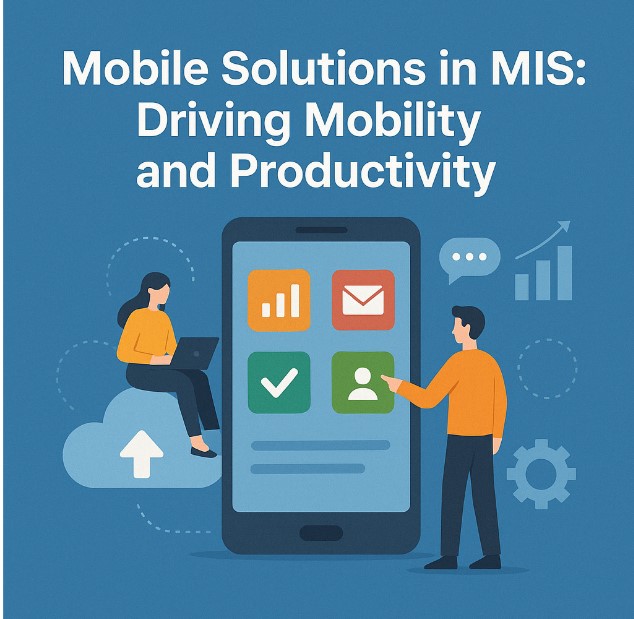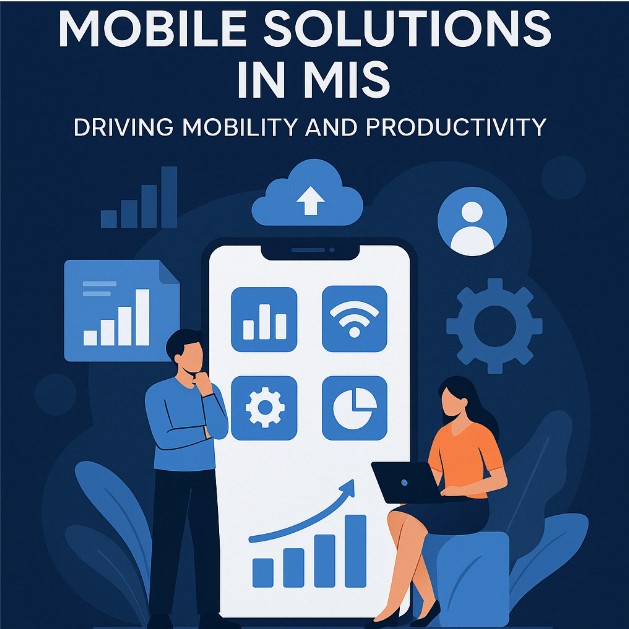
Mobile Solutions in MIS: Driving Mobility and Productivity
In today’s fast-paced, technology-driven business environment, mobility and accessibility have become essential to organizational success. Management Information Systems (MIS) have long been a fundamental part of business operations, enabling decision-makers to access and utilize critical data to drive the organization’s performance. However, traditional MIS systems were designed primarily for desktop access, which often restricted the flow of information and delayed decision-making processes. The integration of mobile solutions into MIS is a game-changer, allowing organizations to enhance efficiency, streamline workflows, and increase productivity. This blog delves into how mobile solutions in MIS are reshaping business operations, providing real-time access to data and transforming how teams collaborate and make decisions.
Embracing mobile solutions in MIS isn’t just about staying connected – it’s about transforming how we make decisions, collaborate, and drive productivity. The real-time access to data empowers teams to be more agile, ensuring we stay ahead in a rapidly evolving business landscape.
The Evolution of MIS: A Shift Towards Mobile Solutions
Historically, MIS systems were designed to be accessed within the confines of an office, typically through desktop computers or workstations. These systems provided valuable insights into business operations but were often limited by the need for physical presence in the office. As organizations increasingly embraced flexible work structures, such as remote working and mobile workforces, the demand for accessing MIS data from various locations grew.
The rise of smartphones and tablets, combined with advances in cloud computing, paved the way for mobile solutions to be integrated into traditional MIS systems. Today, mobile solutions provide employees with the ability to access and manage critical business data anytime and anywhere, making it possible to stay connected and responsive even while on the move.
Advantages of Mobile Solutions in MIS
- Real-Time Access to Data
- Enhanced Collaboration and Communication
- Increased Productivity
- Faster Decision-Making
- Enhanced Flexibility and Adaptability
- Remote Access and Work-from-Anywhere Models
One of the most significant benefits of mobile solutions in MIS is the ability to access data in real-time. In traditional systems, decision-makers had to wait for reports to be generated, often resulting in outdated or incomplete data. With mobile access, employees can retrieve the latest sales figures, financial reports, inventory levels, or any other critical data instantly, regardless of their physical location. This real-time access is crucial for making informed, timely decisions and staying ahead of the competition.
In today’s globalized and fast-moving business world, collaboration between teams is essential. Mobile MIS solutions enable better communication by providing all stakeholders with access to the same data and reports, regardless of where they are. This means that team members working in different time zones or locations can access the same information and discuss issues in real-time. The improved communication fosters a collaborative culture, where decision-making is more agile, and teams can respond quickly to challenges or opportunities.
Mobile solutions in MIS also contribute to significant productivity gains. In a traditional office setting, employees may be required to be at their desks to complete certain tasks or access reports. However, with mobile solutions, employees can update records, approve requests, and perform essential tasks on the go. Whether on a business trip, at a client meeting, or working from home, employees can stay productive, ensuring that work is not delayed due to location constraints.
Access to up-to-date information through mobile devices allows businesses to make faster decisions. Decision-makers no longer need to wait for emails or reports to arrive; they can access the necessary data instantly. The ability to view KPIs, financial data, or market trends in real-time equips managers and executives to make more informed decisions quickly. This speed in decision-making is essential for businesses operating in dynamic markets, where time is of the essence.
Mobile solutions offer flexibility that is particularly valuable in industries where employees are constantly on the move, such as sales, logistics, or field service. Employees can access and update business-critical data while working outside the office, reducing delays and improving overall workflow. This increased flexibility not only benefits employees but also enhances the company's ability to respond to unforeseen challenges or market shifts promptly.
As businesses increasingly adopt remote and hybrid work models, mobile solutions in MIS have become crucial. Employees can continue to access key systems and collaborate with colleagues regardless of their location. For companies with a distributed workforce, this kind of mobility ensures that employees remain connected and productive, even when they are not physically present in the office. Remote access to MIS platforms also enables organizations to support employees in different regions or countries, promoting a more flexible and adaptable work environment.

Challenges of Mobile Solutions in MIS
- Security Risks
- Integration with Legacy Systems
- Costs of Implementation
- Employee Adoption and Training
Mobile solutions introduce new security challenges, particularly regarding data protection. Since mobile devices are often personal and not always secured to the same level as corporate systems, there is an increased risk of unauthorized access or data breaches. Businesses must implement robust security measures, such as encryption, two-factor authentication, secure mobile apps, and regular security audits, to protect sensitive data from potential threats.
Many organizations still operate with legacy MIS systems that were not designed for mobile access. Integrating mobile solutions into these existing systems can be a complex and time-consuming process. Businesses may need to invest in upgrading their infrastructure or developing custom solutions to ensure that mobile devices can seamlessly interact with traditional systems. Proper integration is crucial to avoid data silos and ensure smooth information flow across all platforms.
While mobile solutions can increase productivity and efficiency, implementing them can be expensive. Businesses may need to invest in new hardware, such as smartphones and tablets, as well as software applications, cloud infrastructure, and employee training. However, the long-term benefits, including increased mobility, faster decision-making, and enhanced productivity, often justify the initial investment.
Adopting mobile solutions requires a shift in how employees work and interact with technology. Some employees may be resistant to using new tools or may not be familiar with mobile-based systems. To ensure successful adoption, organizations must provide adequate training and support to employees, helping them understand the benefits of mobile solutions and how to use them effectively.
The Future of Mobile Solutions in MIS
As mobile technology continues to evolve, so will the capabilities of mobile solutions in MIS. With the advent of 5G networks, faster data transfer speeds will enhance the performance of mobile applications, making it easier to access large datasets quickly. Furthermore, emerging technologies like artificial intelligence (AI), machine learning, and predictive analytics will likely be integrated into mobile MIS solutions, offering deeper insights and smarter decision-making capabilities.
Additionally, as more organizations embrace remote and hybrid work models, mobile solutions will become even more essential. The ability to access MIS systems from anywhere will allow businesses to maintain productivity and stay connected with their workforce, regardless of location.
Conclusion
Mobile solutions in MIS are transforming how businesses operate by enabling real-time access to data, improving collaboration, and boosting productivity. The shift toward mobility allows organizations to make faster decisions, adapt to changing conditions, and support a more flexible, remote workforce. While challenges such as security risks, integration issues, and implementation costs exist, the benefits far outweigh the obstacles. As mobile technology continues to advance, the potential for mobile solutions in MIS will only grow, helping businesses stay competitive in an increasingly mobile-driven world.
For businesses looking to stay ahead of the curve, adopting mobile solutions in MIS is no longer a luxury but a necessity for future growth and success.
Are you ready to unlock the full potential of your business with mobile-enabled MIS solutions?
